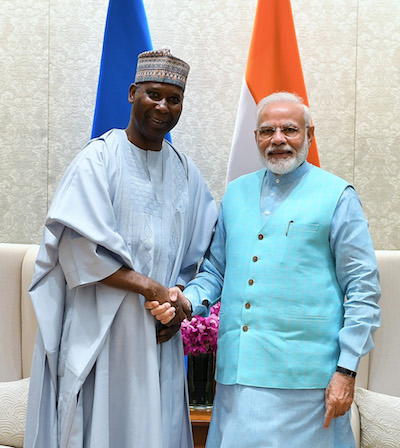“India is expected to be a key partner for the new President of the UNGA in achieving progress on his priorities. As a country increasingly dependent on international cooperation for her growth (with her international trade contributing as much as 40% to her GDP), India’s national interests today are aligned with multilateralism. Her foreign policy is active on a multi-polar level, balancing the demands of India’s accelerated national development with the over-riding requirement for peace and security”, says the author.
India’s Prime Minister Shri Narendra Modi is expected to visit New York twice towards the end of September 2019. First, he is scheduled to participate in the special Climate Action Summit of the UN Secretary General on 23 September 2019. The Prime Minister initiated a visionary platform for Climate Action during the 2015 Paris Conference on Climate Change, which has resulted in the establishment of a 121-country International Solar Alliance in India. India’s leadership in the use of renewable energy to mitigate the adverse effects of Climate Change will be underscored by the inauguration of a solar panel system for supply of energy to the UN Headquarters Building in New York during the Summit.
Prime Minister Narendra Modi is expected to return to the United Nations in New York on Friday 27 September 2019 for his address to the UN General Assembly (UNGA). During his absence from the High-Level Segment of the UNGA debate between 2016-2018, the international situation has become more polarized. One of the biggest challenges to the principle of international cooperation which drives multilateralism in the United Nations is from growing unilateralism, especially among the major powers.
In response to this challenge, the 193 member-states of the UNGA adopted on 14 June 2019 a unanimous resolution reaffirming their collective “faith to multilateralism” as the theme of the 75thAnniversary of the United Nations next year. The newly elected President of the 74thSession of UNGA, Professor Tijjane Muhammad-Bande of Nigeria, was given the mandate to appoint two co-facilitators to “lead and conclude inter-governmental negotiations on the declaration” to be adopted by the 75thanniversary UN Summit scheduled for 21 September 2020.
Professor Tijjane Muhammad-Bande visited India in the first week of September this year. He called on Prime Minister Shri Narendra Modi, had discussions with External Affairs Minister Dr Subrahmanyam Jaishankar, and interacted with Indian policy makers in renewable energy, technology and sustainable development. He delivered a lecture at the prestigious Indian Council of World Affairs in New Delhi, during which he focused on the priorities ahead of him during his Presidency of the UNGA.
Reaffirming the relevance of the UN, and focusing on eradication of poverty, quality education, inclusion and partnerships to overcome global challenges, were among his top priorities. Each of these areas will play a critical role in reaffirming the mandate of the UNGA to respond to challenges to multilateralism today. At the heart of this activity will be the need for effective international cooperation.
India is expected to be a key partner for the new President of the UNGA in achieving progress on his priorities. As a country increasingly dependent on international cooperation for her growth (with her international trade contributing as much as 40% to her GDP), India’s national interests today are aligned with multilateralism. Her foreign policy is active on a multi-polar level, balancing the demands of India’s accelerated national development with the over-riding requirement for peace and security.
To meet this requirement, India needs to catalyze an early conclusion to the decades-long inter-governmental negotiations in the UNGA on reforming the primary UN organ responsible for peace and security, which is the UN Security Council. The objective of the reform is to make the Security Council more equitable in decision-making, more transparent and more representative, so that it can respond more effectively to challenges to international peace and security.
India’s decades-long experience of confronting threats to peace, security and sustainable development from cross-border terrorism drives her objective to work within the legal committee of the UNGA to make it obligatory under international law for UN member-states to either prosecute, or extradite for prosecution, alleged terrorists. This is the heart of the proposed Comprehensive Convention on International Terrorism or CCIT, which has been gridlocked in the legal negotiations of the UNGA for many years, despite India having provided a first draft of a possible CCIT in 1996. An early harvest of the CCIT also impacts on India’s reported interest in hosting a global counter-terrorism conference during the coming months.
However, the heart of India’s engagement with the United Nations remains the creation of a responsive multilateral framework for eradicating poverty and accelerating socio-economic development for the transformation of India. She is therefore expected to provide critical support for the UNGA to operationalize the commitments made during the negotiations of Agenda 2030 on Sustainable Development, adopted unanimously by world leaders during Prime Minister Modi’s last visit to New York in September 2015. Foremost among these commitments is support for financial flows from multilateral financial institutions, and a functional technology facilitation mechanism.
The UN Secretary General’s ambitious High-Level Report on Digital Cooperation, issued on 10 June 2019, will play an important role with respect to the use of technology for sustainable and inclusive development. With her own ambitious Digital India program for empowerment and development, India is well placed to bring the calls for increased multilateralism and international cooperation through multi-stakeholder partnerships contained in the Report into the UNGA’s preparations for the 75thanniversary Summit of the UN in September 2020.
(The author is a former Permanent Representative of India to the United Nations , and Distinguished Fellow, Vivekananda International Foundation)
